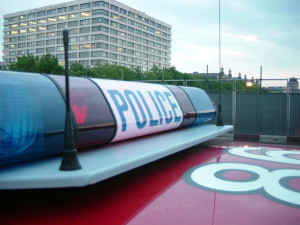 In Commonwealth v. Tavares, the Supreme Judicial Court reversed the denial of the defendant’s motion to suppress evidence obtained from the search and seizure of a motor vehicle in which he was a passenger, because the police officer improperly extended the duration of the stop of the vehicle.
In Commonwealth v. Tavares, the Supreme Judicial Court reversed the denial of the defendant’s motion to suppress evidence obtained from the search and seizure of a motor vehicle in which he was a passenger, because the police officer improperly extended the duration of the stop of the vehicle.
The basic facts were as follows. “On the evening of May 21, 2007, John Lima was driving [a] Nissan Altima automobile, along with his friend Jorell Archer … in Brockton…. [A]nother car sped up and began to ‘tail’ them…. Lima became ‘aggravated’ and applied his brakes, giving the car behind him a ‘brake job’ as it followed them. The other car then drove up to the passenger’s side of the Altima, and someone fired seven or eight gunshots at them,” killing Lima. “The other car quickly sped away before Archer could determine the type of car or the number of people inside it.” “At the scene, the police interviewed an eyewitness, Nicholas Melo,” who reported that moments after he heard gunshots, he “witnessed a car [a Chevy Malibu] round the corner near his house, hit the curb, and speed down the street…. The day after the shooting, a police officer” on patrol was driving in Brockton when he passed a Chevy Malibu…. [B]elieving that he recognized an individual with an active arrest warrant [Correia] in the back seat,” the officer stopped the Malibu. “As he approached the vehicle, the officer quickly realized that the individual … in the back seat” was not Correia. “Instead, he found Christopher Hanson in the driver’s seat, the defendant in the front passenger’s seat, and [another man] in the back seat. The officer made brief conversation with the three occupants before learning that Hanson was not on the rental agreement for the vehicle. The officer then advised Hanson that … the vehicle would have to be towed. All three occupants left on foot.” The police towed the Malibu to the police station and brought Melo there to view the vehicle. Melo identified it as “the same car he had seen the night before and stated that it should have scrape marks underneath the front driver’s side quarter and the rear passenger’s side quarter — where the car had gone over the curb.” A detective “looked under the Malibu” and “observed what appeared to be fresh scrape marks in the area where Melo said they would be.”
After the return of indictments against the defendant, he filed a motion to suppress the evidence obtained by the Commonwealth as a result of the stop of the Malibu, including Melo’s identification of the vehicle, the exterior damage to the vehicle, and latent fingerprints belonging to the defendant that were obtained from the interior of the vehicle. The judge denied the motion and the defendant was convicted of first degree murder and related offenses. On appeal, he challenged the denial of his motion to suppress, claiming that the officer should have immediately discontinued the stop of the Malibu “once [he] realized that [he] had mistakenly identified the rear passenger.”
In its decision reversing the judge’s ruling and the defendant’s convictions, the SJC stated, “We agree that the stop should have been discontinued once the officer[] determined that Correia was not in the vehicle.” Therefore, “the unnecessarily prolonged stop constituted an illegal seizure. We further conclude that, under the circumstances here, the evidence obtained from the subsequent impoundment and search of the Malibu was the direct result of the illegal seizure of the defendant, and that the Commonwealth has failed to meet its burden of proving that the evidence from the Malibu was sufficiently attenuated from the illegal seizure such that it should not be deemed a forbidden ‘fruit of the poisonous tree’ under art. 14” of the Massachusetts Declaration of Rights. “Accordingly, the … judge erred in denying the defendant’s motion to suppress the evidence obtained from the search of the Malibu.” In so ruling, the Court noted that “[i]t It matters not whether the defendant … had standing or a reasonable expectation of privacy in the Malibu once it was impounded by the police. As we have recently noted, evidence may be suppressed as fruit of the poisonous tree ‘even if it is found in a place where the defendant has no reasonable expectation of privacy.’ [Commonwealth v.] Fredericq, 482 Mass. [70,] 78 [2019].” The Court concluded that the erroneous denial of the defendant’s motion to suppress was not harmless beyond a reasonable doubt, because “[t]he evidence obtained from the Malibu … was particularly important in connecting the defendant to the shooting.”
If you or a loved one is in a situation where the police obtained evidence against you as the result of a warrantless search, you will need an attorney to fight to suppress that evidence. Attorney Daniel Cappetta is an experienced and skilled attorney who has litigated numerous motions to suppress. Call him today for a consultation to determine whether you have a strong motion that should be litigated.
 Massachusetts Criminal Lawyer Blog
Massachusetts Criminal Lawyer Blog

